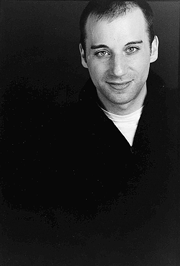Anton Dudley talks about his look at youthful hustling on Britain’s mean streets
A slag heap is where you, well, where you dump old, used-up metal and other junk. Dave and Ashley and Fran and their friends are only in their early 20s, if that, but they’re headed for the slag heap, and they know it—in their bones, if not their heads.
They are the kids on the mean streets of the United Kingdom who will do or submit to anything sexually for a quid or two—anything at all.
“How old was you when you first slagged?” Dave asks Ashley. “We started together,” she says.
“Yeah,” says Dave, “but I’d been doing it in school before. Just to get out of the house, living with my bloody great aunt. I was 13 the first time, with the bloody postman. ‘Can I come in and have a cup of tea, bit tired walking about delivering all these letters.’ I’d never seen what a postbag looked like anyway, right interested to see all those bloody letters, I was. Then he undid his pants and asked how old I was.”
That’s about as tame a passage as you can find in any dozen consecutive lines of “Slag Heap,” a play by Anton Dudley, that’s waking people up—by hammering them over the head—at the Cherry Lane.
The other interesting thing about it—one of the other interesting things—is that clever young Dudley, who reaches 30 any day now, is not a Brit but an American. Still, he said, he and his parents have spent much time over the years in Manchester, where the play begins, and in London, where it unpeacefully ends.
How much of the drama is observed from life, how much is imagined?
“I think the truth for any writer,” he replied, “is emotional truth. Brecht says: ‘Art is truth.’ You see something on the stage, it becomes true.”
Well, this is a pretty rough play with pretty rough truths.
“Dave and Ashley and Fran are characters. Appropriate vessels.” Two words that, in context, are just about as rough as the play.
You paint a fairly ugly world.
“I feel there’s beauty in it too. My mentor, Mark Dickerman, chair of the department of dramatic writing at the Tisch School, says the true meaning of beauty is that there is terror in it.”
Don’t let’s talk any more about emotional truth.
“That’s all I talk about,” Anton Dudley blithely responded.
Another advisor during the creation of “Slag Heap” at Tisch was Tony Kushner. That climaxed in a two-day full production at NYU’s Tisch, out of which came a recommendation for further development via a three-week workshop under playwright Ed Bullins in the Mentor Program at the Cherry Lane.
The only member of that cast who carries over into this one is Brianin Bryant as Fran. Her new colleagues are Polly Lee as Ashley, Vincent Karhteiser as Dave, and Alexander Flores, Maggie Moore and Janelle Anne Robinson in support. Michael Morris directs.
Anton Dudley, whose mother is a painter and whose father is “in communications,” was born in Montreal and brought up, he said, all over the place—“almost every state, and also Toronto.” From a BA in drama at Vassar, he went to work as a fledgling director in Washington, D.,C., before deciding, while at graduate school in Los Angeles, that he really wanted to be a playwright.
His works for theater include “The Lake’s End,” described by its author as “a pre-World War II gay romance in Italy,” and “Honor and the River,” set in a New England boarding school where “a boy who’s afraid of water is forced to join the rowing team.”
Dudley didn’t specify the emotional truth of that one.
“Every play I’ve ever written has a gay character somewhere in it,” he said, “Although I think that ‘Slag Heap’ is not about sexuality at all. It’s about people disconnected from their physical selves. It goes beyond pornography. It’s about a body becoming an object rather than a subject. When a body becomes a commodity, it’s no longer human.”
The play takes place in Britain in the early 1990s, “just post-Thatcher, when the working-class factory towns suddenly lost their purpose—an incredible change—just as in this country.”
At present, Aton Dudley, who prefers to spell his name all lower-case, lives not in Manchester or London but in Brooklyn. With anybody? Without anybody?
“I don’t know,” came the answer.
‘Slag Heap is full of wonderful words, as in the following:
ASHLEY: You know something, Dave, you’re lucky.
DAVE: Why’s that?
ASHLEY: You’ve got a jottlebob between your legs.
Jottlebob? Do the kids in England say that?
“I made it up. I like making up words.”
That certainly adds to the emotional truth.
gaycitynews.com



































